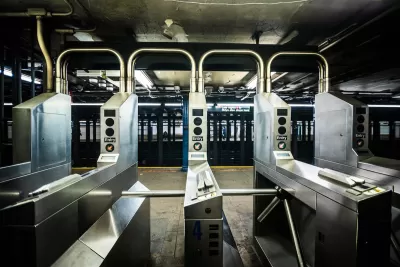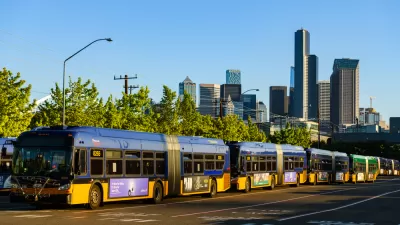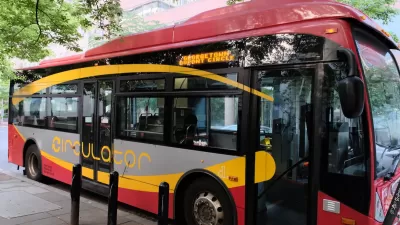The loss of revenue from fare evasion is a drop in the bucket compared to the fiscal cliff facing major U.S. transit agencies.

In an opinion piece published in Streetsblog, Sogand Karbalaieali argues that debates over fare evasion on public transit systems largely miss the point.
According to Karbalaieali, the revenue losses caused by people jumping turnstiles or failing to tap their payment cards pale in comparison to “a more significant and fundamental problem:” the massive budget shortfalls faced by many U.S. transit agencies, including the the Washington Metropolitan Area Transit Authority (WMATA) in Karbalaieali’s home region.
While news outlets are preoccupied with fare evasion and WMATA's strategies to combat it, a more significant question emerges: How else can WMATA generate revenue?
Karbalaieali suggests “creative solutions for generating revenue through underutilized parking spaces” by converting WMATA-owned lots to other types of development. The article also blames parking requirements for driving up the cost of housing.
Ultimately, Karbalaieali writes, fare evasion is a distraction from much more critical priorities. “While addressing fare evasion is important, the more pressing urgency lies in achieving our climate goals, promoting healthy lifestyles, fostering sustainable transportation, and building resilient infrastructure.”
FULL STORY: Opinion: Fights Over Fare Evasion Are Missing the Point

Planetizen Federal Action Tracker
A weekly monitor of how Trump’s orders and actions are impacting planners and planning in America.

Maui's Vacation Rental Debate Turns Ugly
Verbal attacks, misinformation campaigns and fistfights plague a high-stakes debate to convert thousands of vacation rentals into long-term housing.

San Francisco Suspends Traffic Calming Amidst Record Deaths
Citing “a challenging fiscal landscape,” the city will cease the program on the heels of 42 traffic deaths, including 24 pedestrians.

Amtrak Rolls Out New Orleans to Alabama “Mardi Gras” Train
The new service will operate morning and evening departures between Mobile and New Orleans.

The Subversive Car-Free Guide to Trump's Great American Road Trip
Car-free ways to access Chicagoland’s best tourist attractions.

San Antonio and Austin are Fusing Into one Massive Megaregion
The region spanning the two central Texas cities is growing fast, posing challenges for local infrastructure and water supplies.
Urban Design for Planners 1: Software Tools
This six-course series explores essential urban design concepts using open source software and equips planners with the tools they need to participate fully in the urban design process.
Planning for Universal Design
Learn the tools for implementing Universal Design in planning regulations.
Heyer Gruel & Associates PA
JM Goldson LLC
Custer County Colorado
City of Camden Redevelopment Agency
City of Astoria
Transportation Research & Education Center (TREC) at Portland State University
Jefferson Parish Government
Camden Redevelopment Agency
City of Claremont





























